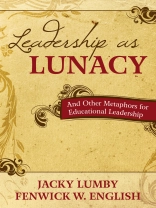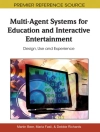‘This book will challenge, enlighten, and transform. The authors invite us to re-examine our core values as educational leaders, reconsider our priorities, and place the humanity of children at the center of our work.’
—Nancy Skerritt, Assistant Superintendent, Tahoma School District, Maple Valley, WA
‘By their analysis, Lumby and English expose the power of language to shape meaning. By their skill, they illustrate the power of language to engage and enrich. Their work is an important contribution to how we understand and practice leadership in all fields.’
—Steven R. Thompson, Coordinator, School Leadership Program, Miami University
An imaginative approach to rethinking and revitalizing your leadership practice!
Research has shown that metaphors inspire leaders to reflect on their mind-sets, behaviors, practices, and approaches, leading to new perspectives on their roles. Using such thought-provoking and unexpected metaphors as ‘leadership as war’ and ‘leadership as lunacy, ‘ the authors draw readers through historical perspectives and cognitive possibilities that inspire, resolve, confuse, and provoke reflection on the state of leadership in education. This book examines the current discourse on educational leadership models, behaviors, and roles, and helps school and district leaders:
- Understand the power of metaphor and how metaphors have been used to define leadership
- Develop a deeper connection to their roles and their approaches
- Initiate change in themselves and in others
By inspiring creative thinking and critical reflection, Leadership as Lunacy helps leaders achieve personal and professional growth and invigorate their professional relationships!
Tabella dei contenuti
Preface
About the Authors
1. The Presence and Power of Metaphors
Not Just Words
From Gilgamesh to Obama: Metaphors Communicate and Connect
How Metaphors Work
Why a Book About Metaphors for Educational Leaders?
Structure
Toward a New Kind of Wisdom
2. Leadership as Machine
Running the Factory
Leaders Running the Machine
Evaluating the Machine
On Being a Machine
The Machine Metaphor
3. Leadership as Accounting
The Relentless Pursuit of Rationality and Waste
Educational Hyperrationalization
The Cheating Culture: Corrosion of the Means/Ends Accountability Continuum
The Accounting Metaphor: A Chimera Wrapped Up as an Ideology
4. Leadership as War
Preparing for a Board Meeting
The Ambivalence of War Metaphors
Military Admonitions, Educational Situations, and Contradictions
The Way of the Warrior Is Death: Education Is Life
5. Leadership as Sport
Sports: Language and Action
The Little ?Closed-System? World of an Athletic Team
The Problem of the Charismatic Coach as a Model for the CEO
Understanding the Nature of Power
The Sports Metaphor: An Impossible Dream
6. Leadership as Theater
The School as Stage: What Lies Beneath?
The School as Staged: Long Run or Repertory?
The School as Staged: Acting Leadership
The School as Ritual Performance
School as Theater
7. Leadership as Religion
The Concept of the External Supreme Being
Towards Perfection: The Idea of Progress
Manifestations of Religion in Management and Educational Leadership
The Presence of ?Managementspeak? and Religious Rituals in School Practices
Warring Metaphors
The Power of Religious Metaphors: The Universal Versus The Dogmatic and Partisan Experience
Learning How to Lead Outside the Command and Control Model
8. Leadership as Lunacy
Lunacy as a Form of Toxicity
Leaders as Lunatics
The Lunatic Psyche
Symptoms, Signs and Pathologies
The Lunacy Metaphor
9. Metaphors of Leadership
The Uses of Metaphors
Grand Narratives
Positive Metaphors
So, Where to Now?
References
Index
Circa l’autore
Fenwick W. English (Ph.D.) is the R. Wendell Eaves Senior Distinguished Professor of Educational Leadership in the School of Education at the University of North Carolina at Chapel Hill, a position he has held since 2001. As a scholar/practitioner he has held positions as a school principal and superintendent of schools in California and New York and as a department chair, dean, and vice-chancellor of academic affairs at universities in Ohio and Indiana. He is the former President of the University Council of Educational Administration (UCEA) and of the National Council of Professors of Educational Administration (NCPEA). His research has been reported in national and international academic forums. He edited the 2006 SAGE Encyclopedia of Educational Leadership and Administration, the 2009 SAGE Library of Educational Thought and Practice: Educational Leadership and Administration; and the 2011 SAGE Handbook of Educational Leadership (2nd Ed.). In 2013, he received the Living Legend Award from NCPEA for his lifetime contribution to the field of educational leadership.












